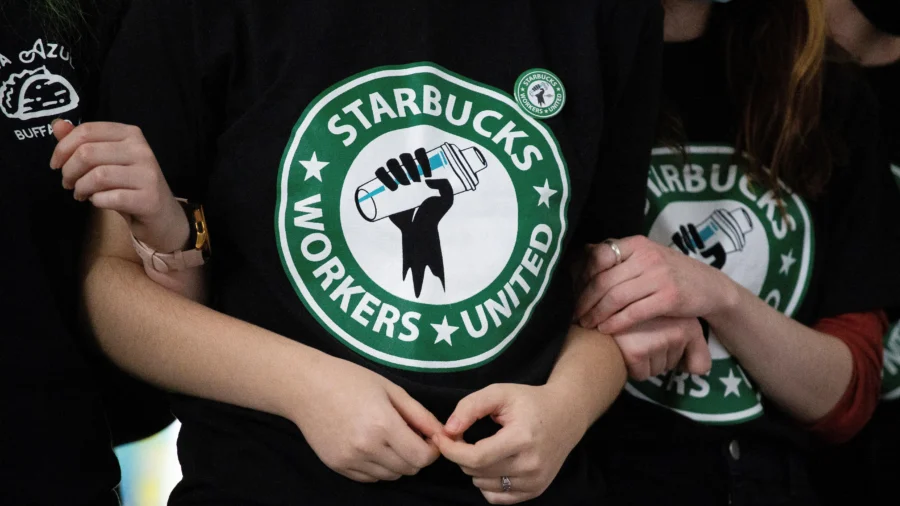The Supreme Court will review Starbucks’ appeal against a lower court’s order to rehire labor activists in Memphis, Tennessee. The activists were dismissed following their disclosure of a union organizing drive to local media.
For years, the coffee chain has been battling an organized labor movement that has been actively trying to unionize baristas across the United States.
In this case, the U.S. Court of Appeals for the 6th Circuit upheld a federal district judge’s temporary order directing the company to reinstate a group of employees known in organizing circles as the Memphis Seven.
The National Labor Relations Board (NLRB), an independent federal agency that aims to protect the rights of private sector employees to join together to improve their wages and workplace conditions, said Starbucks blocked lawful organizing activities by the baristas.
The union had complained to the board and filed unfair labor practice charges, alleging Starbucks interfered with the workers’ right to form a union, and discriminated against union members.
The board secured a preliminary injunction that compelled the company to temporarily rehire the fired employees.
The decision to grant the petition for certiorari, or review, in Starbucks Corp. v. McKinney, came on Jan. 12 in an unsigned order. No justices dissented. The court did not explain its decision. A minimum of four of the nine justices have to vote to grant a petition for it to move forward to the oral argument stage.
The respondent is M. Kathleen McKinney, the regional director for Region 15 of the NLRB, who is being sued in her official capacity.
Under the National Labor Relations Act, the NLRB hears complaints about employers engaged in unfair labor practices. Section 10(j) grants the NLRB the power to seek ‘appropriate temporary relief or a restraining order’ while its adjudication process is ongoing. It also empowers federal district courts to issue “such temporary relief or restraining order as they deem just and proper.”
The NLRB seeks court orders when delays in deciding unfair labor practice cases might undermine the effectiveness of the final ruling or to protect the status quo at a workplace during the case’s administrative process. Once the NLRB makes its decision in the case, these temporary injunctions are lifted, according to a Bloomberg Law summary.
The Supreme Court may resolve a disagreement among federal courts of appeal over the legal test relied on in assessing NLRB applications for temporary injunctions against employers accused of running afoul of federal labor law.
‘Ideal Vehicle’
In its petition (pdf), Starbucks argued that the case was “the ideal vehicle for resolving an entrenched, frequently recurring, and squarely presented circuit split over what standard the National Labor Relations Board … must satisfy for federal courts to preliminarily enjoin alleged unfair labor practices during the pendency of Board administrative proceedings.
“That split carries enormous consequences for employers nationwide and unacceptably threatens the uniformity of federal labor law.”
The 4th, 7th, 8th, and 9th Circuits require the NLRB to use the traditional test under which preliminary injunctions are treated as “an extraordinary remedy that may only be awarded upon a clear showing that the plaintiff is entitled to such relief.”
But the 3rd, 5th, 6th, 10th, and 11th Circuit impose a looser “reasonable cause” test that is “no real obstacle” to securing injunctions, the petition says.
The NLRB only has to demonstrate “reasonable cause” to believe that employers participated in unfair labor practices, which means the board’s “burden” is “relatively insubstantial.”
“As the NLRB’s internal manual on section 10(j) injunctions puts it: The ‘threshold of proof … is low.’”
U.S. Solicitor General Elizabeth Prelogar wrote in a brief (pdf) that the federal district court determined that Starbucks fired “more than 80% of the union organizing committee at the Memphis store” and “discouraged and eroded support for a nascent unionization movement.”
As a result of the company’s activities, “employees had stopped publicly supporting the union, wearing union pins, engaging in union protests, and discussing union activity in the Memphis store, and the lone remaining union activist at the store was too fearful to recruit other employees to support the union.”
‘Poor vehicle’
Ms. Prelogar urged the Supreme Court not to take the case because it would be “a poor vehicle for resolving the question presented because [the] petitioner has not shown that the court of appeals would have reached a different outcome by applying a four-part test rather than a two-part test.”
The Supreme Court’s last major labor law case was in June 2023. The court ruled 8-1 that a union’s deliberate destruction of company property as a pressure tactic in a labor dispute isn’t protected by federal law.
Labor activists have said that endangering and destroying company property during a dispute is fair game that has long been protected by the law, but companies such as the petitioner in this case—Glacier Northwest, a ready-mix concrete company headquartered in Seattle that does business as CalPortland—pushed back.
The ruling allows companies to sue striking unions to hold them accountable for damage caused during labor actions.
The decision in Glacier Northwest Inc. v. International Brotherhood of Teamsters Local Union No. 174 itself allowed the company to sue the union in state court.
In the case at hand, The Epoch Times reached out to Starbucks’ attorney, Lisa Blatt of Williams and Connolly in Washington, for comment as well as the U.S. Department of Justice, but did not receive a response at the time of publication.
An oral argument has not yet been scheduled in the case. A decision could come by June.
From The Epoch Times


